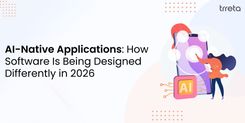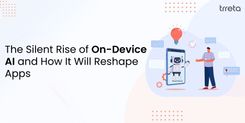Artificial intelligence in healthcare represents a transformative approach in supporting patient care and medical service providers. It contributes to more accessible medical response by automating routine tasks.
This allows healthcare providers to focus on delivering responsible, quality patient care. However, unlike humans, AI may not be apt to deliver the most reliable outcomes for complex scenarios, such as lab testing rare diseases or advancing drug discovery.
Understanding both the pros and cons is key to navigating AI’s role responsibly in healthcare. In this blog, we will discuss the benefits and drawbacks of AI for both patients and healthcare service providers to arrive at a better conclusion.
Pros of AI in Healthcare for Medical Service Providers
Statista’s 2024 survey shows that 73% of healthcare organizations report generative AI to be beneficial in clinician/clinical productivity. Here’s how AI can help you:
1. Streamlining Routine Patient Care: Healthcare Services
Today, almost all major Electronic Health Record (EHR or EMR) platforms are incorporated with AI. It helps healthcare organizations detect patterns in patient records and design personalized treatment plans.
Depending on the type of CRM or healthcare software system your business operates on, AI can schedule and manage many tedious tasks. This includes appointment scheduling, medical insurance reviews, tracking patients with due meetings, or virtual meetings.
Automating these tasks helps you focus more on patients, improving satisfaction and increasing retention. Moreover, AI enhances medical precision in life-critical situations so that healthcare providers can provide their expertise where it matters most.
2. Analyzing Large Datasets: Processing Data

Processing vast amounts of data accurately and efficiently is one of AI’s greatest strengths. Modern medical systems generate enormous amounts of data, including patient medical histories, imaging pathology test results, and genetic information.
Manually analyzing these datasets is time-consuming and prone to errors. AI algorithms, however, can process this information at enormous speeds, identifying sequences, correlations, and insights that might be missed during human analysis.
For healthcare providers, this means access to real-time diagnoses, treatment plans, and patient monitoring. AI-powered tools also provide predictive analytics, helping you anticipate potential health risks and intervene early.
3. Surgical Accuracy: Using AI in Pathology Testing

Using AI in healthcare, doctors can create a 3D model of a patient’s anatomy to generate MRI and CT scan reports. These models allow healthcare professionals to prepare for complex operations with utmost precision.
Moreover, AI now enables pathologists to process varied biological data to identify early-stage symptoms and patterns in physical behavior. For example, AI tools can help you read biopsy images, detect cancerous cells, and predict disease progression.
These capabilities are invaluable during surgeries where real-time pathology results can guide surgeons in making critical operational decisions (including tumor operations). Prominent AI tools for surgical accuracy include Tempus, Proscia, PathAI, and PathomIQ.
4. Drug Discovery: Research and Analysis
The traditional drug development process has long been a challenge for the pharmaceutical industry. The process often involves years of trial and error and huge research costs with no scope of success. However, using machine learning and AI systems, companies can analyze vast datasets to pinpoint promising drug candidates more efficiently.
AI tools can also simulate how different molecules interact with biological systems. Additionally, they bring precision to clinical trials by identifying the right participants to track outcomes faster and more accurately.
Cons of AI in Healthcare for Medical Service Providers
Integrating AI in healthcare comes with certain challenges that you must address to ensure balanced and ethical adoption.
1. Increased Unemployment: Reduced Healthcare Professionals
Automating tasks performed by healthcare professionals and maintenance staff has raised concerns about low job vacancies. AI-driven tools now manage hospitality functions like diagnostics, lab testing, and administrative tasks, reducing human involvement.
Even if this improves efficiency, it also poses a risk to the employment of technicians, radiologists, pathologists, and even routine task handlers. The challenge lies in retraining professionals for roles that complement AI while seeing that technological advancement does not lead to widespread job loss.
2. Misguided Data: AI-biased or Misdiagnosis
AI is all about data; the more information you ingest, the more precise results you will get. However, it might generate false data or showcase lab results inaccurately for particular demographics, illnesses, or environmental factors.
This issue is highly relatable when creating treatment plans for particular patients, as the data related to a rare medicine can be scarce. Also, healthcare professionals rely on patient behavior analysis to diagnose or recommend appropriate treatment.
AI can prove beneficial in early disease detection, treatment options, and diagnosis outcome projection. However, depending entirely on it to work closely with the patient can prove to be a premature decision.
3. Prone to Cyber Attacks: Breaching Patient Confidentiality
AI systems have become the prime targets for cybercriminals. Healthcare software systems have vast amounts of patient data. A breach can compromise sensitive patient information, increasing misuse of medical records.
Such data loss can cause healthcare providers to face financial, reputational, and even compliance damage. Even resilient defenses cannot eliminate the risk entirely, making cyber attacks a constant concern in AI-powered healthcare systems.
4. High Implementation Costs: Use of AI Needs Acknowledgment
The cost of adopting AI in healthcare can be a major hurdle, particularly for small-sized healthcare providers. Expenses like training staff, building robust digital systems, and developing AI-powered tools can add up quickly, making it difficult for businesses with limited resources to keep up.
The upfront investment in AI is substantial for many, even though the long-term benefits may outweigh the costs. Managing this balance requires careful planning and a multi-phased approach to its adoption, ensuring that smaller practices can also lead to proper benefits of using AI.
Pros of AI in Healthcare for Patients
AI has transformed the way healthcare is delivered, which brings certain benefits to patients in terms of personalized care and accessibility.
1. Personalized Treatment Plans

AI provides patients with personalized treatment plans based on medical history, genetic information, and lifestyle choices. It can create precise strategies for managing health conditions that enhance the chances of successful outcomes.
It also eliminates the trial and error method in treatment, leading to faster recovery times. Moreover, as patient conditions evolve, doctors can create real-time treatment plans for their patients. This ensures that you feel confident about the prescription you receive.
2. Early Diagnosis: Preventive Cure

AI helps detect health problems early by analyzing your medical data and pathology results to spot risks or warning signs that might not be obvious. This allows your doctor to start treatment sooner or recommend lifestyle changes to prevent serious issues.
Early diagnosis can make treatments more effective, helping you stay healthier and avoid complications down the road. AI empowers doctors to start treatments sooner or recommend preventive measures like lifestyle changes to mitigate serious conditions.
3. Remote Healthcare Monitoring
AI-powered devices and wearable technology make it easier for patients to stay connected with their healthcare providers from the comfort of their homes. These tools monitor vital signs, track chronic conditions, and alert doctors instantly when intervention is needed.
This saves time and effort alongside ensuring that patients receive timely care, particularly those living in remote areas or with limited mobility. Moreover, patients gain greater autonomy in managing their health.
4. Complete Access to Medical History

AI does the most accessible job for you by keeping track of all your medical records in one place. While documentation and paperwork are essential for absolute medication in healthcare, having digital records of your medical history can prove viable for remote healthcare monitoring.
AI ensures doctors have all the necessary information to make informed decisions by organizing and analyzing your medical history. This process has fewer missed details and a smoother treatment process, especially during emergencies or when visiting new healthcare providers.
Cons of AI in Healthcare for Patients
While AI enhances healthcare efficiency, it may lead to challenges for you like unethical practices, lack of AI understanding, and reliability.
1. Ethical & Social Bias in AI Algorithms
AI machines can sometimes be biased in generating data they are trained on, leading to inefficient medical diagnosis. It cannot act on social variables that are not easily identifiable, like a patient’s social, economic, or personal preferences.
Healthcare providers must have open discussions with patients to understand their complete needs, as these factors can significantly impact their mental well-being and treatment success.
2. Lack of AI Understanding

Elderly patients may find it difficult to understand how AI works in healthcare. They may question how a machine can assess their medical condition accurately and generate suitable treatment recommendations.
This lack of understanding creates a barrier to trusting AI-driven healthcare tools, making it essential for healthcare providers to educate patients about how AI is used. The lack of acknowledgement leads to substantial data errors or unfilled details.
3. Patient Reliability & Trust Issues
Trust is a cornerstone of healthcare, but many patients struggle to rely on AI. Questions about diagnostic accuracy, medication privacy, and accountability often create confusion. Healthcare service providers must ensure transparency about how AI tools function in healthcare software development.
Maintaining high accuracy and incorporating human overview is important. By doing so, you can be fully aware of where your data goes alongside helping validate AI-generated recommendations and reassure patients about their dependability.
4. Human Touch for Effective Health Diagnosis

Healthcare goes beyond data and numbers—it’s about understanding a patient’s emotions, concerns, and overall well-being. While AI can process and analyze your medical history quickly, it lacks the abstract awareness that only humans can provide.
It also allows patients to feel heard and valued during their medication period. Abstract awareness is something that AI lacks when compared to humans. Thus, patients feel more secure in sharing their medical condition to a person than a robot.
Role of AI in Transforming Healthcare: Current Trends & Future Potential
AI in healthcare is well-known because of certain benefits that you can accept like remote medicine services, appointment scheduling, virtual meetings, etc. These trends are reshaping how the medical industry aligns with the digital world.
Current Trends:
- AI in Predictive Analytics: AI models are helping hospitals manage resources by forecasting patient inflow. Medical service providers can also identify high-risk cases and focus on their operational procedures.
- AI in Diagnostics: AI algorithms are widely adopted today for analyzing medical images, such as X-rays and MRIs. AI tools, like Google's DeepMind, have shown near-human accuracy in detecting retinal diseases and early signs of cancer.
- Telemedicine with AI: AI-powered tools are enhancing telemedicine platforms by processing Natural language and using chatbots. They provide preliminary consultations for top-notch medication to save time in a life and death sitaution.
Future Potential:
- Personalized medicine using AI: Customized treatment plans based on an individual's unique genetics are becoming a reality with advancements in genomics study,. This could lead to more effective interventions with fewer side effects.
- Drug Discovery Efficiency: AI technology has the potential to reduce the time required for drug discovery from five or six years to just one year, with a cost reduction of up to 70%. This acceleration could generate an economic value of $60 billion to $110 billion annually for the pharmaceutical and medical product industries.
- Patient Care Enhancement: AI-driven solutions are expected to decrease healthcare administrative errors by 86% and could potentially save 250,000 lives by 2030.
Weighing the Pros and Cons Of AI in Healthcare for Responsible Adoption
Artificial intelligence in healthcare is undeniably offering groundbreaking possibilities in healthcare, from personalized treatments to real-time data analysis and surgery precision. However, you must realize that AI is a tool—powerful but infallible.
While AI proves beneficial in managing routine tasks, it poses certain limitations, including ethical concerns and cybersecurity risks. This underscores the importance of thoughtful implementation of AI without complementing the human touch.
To ensure responsible adoption, you must balance AI's potential with its challenges. At Tretta Techlabs, we specialize in developing digital healthcare solutions designed for specific needs. Contact us today to discover how we can bring your healthcare software project to life!
FAQs
How reliable are AI systems for diagnosing rare diseases?
AI systems are improving in diagnosing rare diseases thanks to their ability to analyze vast datasets and identify patterns. However, their accuracy depends on the quality and diversity of the data they are trained on.
What are some real-world applications of AI in drug discovery?
AI has revolutionized drug discovery by analyzing molecular interactions, predicting drug efficacy, and identifying potential candidates faster. Example: AI helps researchers simulate clinical trials and select suitable participants, significantly reducing the time and cost involved.
What legal or ethical concerns arise from using AI in healthcare?
AI in healthcare raises concerns about data privacy, potential bias in algorithms, and accountability for errors. Misuse of patient data or inadequate safeguards can lead to breaches.
What are the risks of relying on AI for surgical procedures?
Technical glitches or errors in interpreting data could lead to complications. Over-reliance on AI might also compromise the ability of surgeons to act in unexpected situations.




